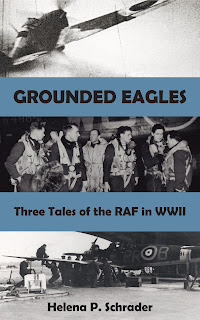"Never in the history of the world," the Luftwaffe recruiter told the teenage girls from the National Socialist Labor Front, "has an air force been asked to perform a comparable task. The Luftwaffe burns to show the Fuehrer what it can do. But," the teacher-turned-airforce-major stopped dramatically, "but the Luftwaffe needs help. It needs your help."
The astonished looks of the two Labor Girls were highly satisfying to the lecturer. "You will be able to tell your children and grandchildren that you -- no less than your brothers and boyfriends in our bomber crews -- helped to subdue the stubborn British lion. Your Camp Leader has selected you as the girls most suitable for this awesome task. Now, I put the question to you: are you willing to help your Fatherland and your Fuehrer by becoming Luftwaffehelferinnen?"
The recruiter had not yet met teenage girls who could resist his harangue.
From the point of view of the Nazi authorities, Klaudia's suitability for the Luftwaffe women's auxiliary was based primarily on her docility, her apparently sincere desire to be a good National Socialist -- and her name. Her father is a second cousin once removed to the legendary WWI ace Baron Manfred von Richthofen and she carries his famous name. In fact, however, Klaudia doesn't know much about either the Luftwaffe or National Socialism. She has grown up on a large estate in the east, the daughter of the estate owner. She is the only surviving child of grief-stricken parents, and has had a lonely childhood because her parents were to deeply wounded by the loss of her brother to give her the love she needs. The village school is also small and she is set apart by her status as the daughter of the landowner. It is not until she reports for her national labor service that she finds herself on an equal-footing among lots of girls her own age. (Young people in Nazi Germany had to serve one year in the Reichsarbeitsdienst or RAD, a highly militarized organization which also sought to indoctrinate youth in National Socialism.)
Suddenly, Klaudia is not only surrounded by girls her own age, she is surrounded by National Socialist institutions, slogans, songs, uniforms and ideology. The change in society, which had largely passed her rural village by, can no longer be ignored. Klaudia is only too willing to embrace the "new Germany". It offers her acceptance and integration and a bright future. So when the Luftwaffe comes to her RAD unit recruiting women to train in communication trades, Klaudia is eager to sign up.
Nor is she disappointed. Work as a Luftwaffehelferinnen soon enables her to go to France. She and her friend Rosa land with the creme-de-la-creme at No. 1 Stuka Group. She finds herself living in a chateau and courted by the most glamorous of the all pilots -- the CO himself, Major Pashinger. Klaudia's sheltered childhood has not prepared for any of this. In very little time, she has been seduced -- only to discover that Pashinger is a married man and his intentions were dishonorable from the start.
Fortunately for Klaudia, her friend Rosa is seeking a transfer to another unit to follow her young man, an aircraft mechanic. Klaudia joins her, and together they arrive at JG 23. The atmosphere here is very different -- less glamorous and less political. These aren't Goering's or Hitler's favorites. Some of the pilots are outright contemptuous of the Nazis. Klaudia is much happier, and knows she would find it hard to resist the charm of Christian Baron von Feldburg -- if only he would show any interest in her.
But Feldburg has eyes only for French girls, and it is his wingman, Ernst Geuke, who has fallen for Klaudia. Ernst isn't exactly dashing, however, and he certainly doesn't come from the kind of background her parents would approve of. Klaudia subtly lets Ernst know she's not interested in his attentions. And then he gets shot down.
"This is the best book on the life of us fighter pilots in the Battle of Britain that I have ever seen.... I couldn't put it down."-- RAF Battle of Britain ace, Wing Commander Bob Doe.
Winner of a Hemingway Award for 20th Century Wartime
Fiction, a Maincrest Media Award for Military Fiction and Silver in the Global Book Awards.
Find out more at: https://crossseaspress.com/where-eagles-never-flew
Also by Helena P. Schrader
they took the war to Hitler.
Their chances of survival were less than fifty percent.
Their average age was 21.
This is the story of just one bomber pilot, his crew and the woman he loved.
It is intended as a tribute to them all.
or Barnes and Noble.

For more information about all my books visit: https://www.helenapschrader.com





No comments:
Post a Comment